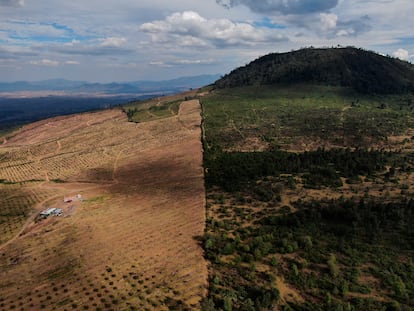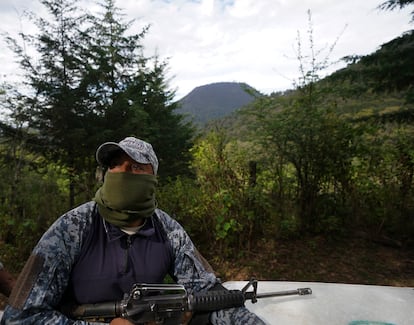Arson, logging and water theft: The avocado industry deforests Mexico
A report by Climate Rights International details the damage caused in producing territories such as Jalisco and Michoacán to meet demand for the export of ‘green gold’ to the United States


Avocado is the in-vogue food in the United States, where its presence in large supermarkets has tripled in the last 20 years. Avocado exports from Mexico bring in more than $3 billion to the sector, but the cost is being paid by the ecosystems of the states of Michoacán and Jalisco, with widespread logging and fires to clear the way for plantations, the theft of water from rivers and streams and violence against environmental leaders. A report presented Tuesday by the NGO Climate Rights International (CRI) quantifies the damage caused to these two regions by the export of green gold, which is often sold under the label of “sustainable.”
Jalisco and Michoacán, where most of the avocado fields in the country are concentrated, are responsible for the entirety of Mexico’s avocado exports to the United States. The CRI report states that the area deforested for these plantations stands at between 16,000 and 28,000 hectares. This figure was obtained from environmental geographers, satellite images and Mexican government estimates.
The deforestation of these areas was carried out contrary to Mexican law, which prohibits “land use change,” according to the report. “Where there is a fire, it is for avocado. They are all arson,” stated one of the 200 residents interviewed for the study. Despite carrying penalties of between six months and nine years in prison, in practice the setting of forest fires has no criminal consequences. Michoacán’s Secretary of the Environment, Alejandro Méndez, stated for the report that these activities put the state’s “biodiversity at risk.” The director of Michoacán’s Forestry Commission, Alejandro Ochoa, was more blunt about the offenders: “They mock us for our uselessness.”
Inaction in Mexico is replicated in the United States, according to CRI. The incorporation of Jalisco as an avocado exporter in 2022 by Joe Biden’s administration “aggravated the problem.” There were even internal government reports warning that the approval of the Mexican state as a producer “would likely increase deforestation” in the area.

The other major environmental impact is the uncontrolled use of water. The avocado trees — one of the most liquid-consuming fruit trees — are being irrigated with water diverted from rivers and streams in the area. The recipients are illegal wells, which a former Michoacán water official estimates to represent over 50% of those in Michoacán. A community leader in Mexico’s avocado-growing region defines the theft of the resource succinctly: “They export our water in the form of fruit.”
Violence surrounding the avocado sector is the other major issue denounced by CRI. Michoacán and Jalisco are two areas where criminal groups have great influence and are linked to plantation businesses. The cartels engage in extortion to obtain land and deforest areas with fires or logging to establish plantations, the report states.
Most worryingly, the NGO has registered 30 threats, kidnappings, and armed attacks against climate activists and native communities in the area. In February of this year, the Indigenous leader and defender of the Purépecha forests of Michoacán, Alfredo Cisneros, was shot and killed after reporting illegal logging.
The “sustainable” brand
Mexico is the world’s largest avocado producer and exporter, and most of it is imported by the United States. For the Super Bowl, the quintessential American football event, Mexican growers provide up to 100,000 tons of the fruit. The marketing agency Avocados From Mexico bills their avocados as “the most sustainable on the market.”
The study singles out several large U.S. companies for being a “key part” of the supply chain for these avocados, which contribute to environmental problems: primarily, large exporters such as Aztecavo or Calavo, which supply large supermarket chains such as Walmart or Costco. The investigation reveals that these companies are receiving avocados from up to 75 orchards planted on deforested soil.
CRI’s study is based on more than 200 personal interviews in 18 municipalities in the states of Michoacán and Jalisco, analysis of satellite maps of more than 50,000 orchards, and analysis of U.S. and Mexican government records. One of the most ambitious of its kind to date, the report reflects the magnitude of the environmental damage caused by agriculture in Mexico to meet the demands of the U.S. market.
Sign up for our weekly newsletter to get more English-language news coverage from EL PAÍS USA Edition
Tu suscripción se está usando en otro dispositivo
¿Quieres añadir otro usuario a tu suscripción?
Si continúas leyendo en este dispositivo, no se podrá leer en el otro.
FlechaTu suscripción se está usando en otro dispositivo y solo puedes acceder a EL PAÍS desde un dispositivo a la vez.
Si quieres compartir tu cuenta, cambia tu suscripción a la modalidad Premium, así podrás añadir otro usuario. Cada uno accederá con su propia cuenta de email, lo que os permitirá personalizar vuestra experiencia en EL PAÍS.
¿Tienes una suscripción de empresa? Accede aquí para contratar más cuentas.
En el caso de no saber quién está usando tu cuenta, te recomendamos cambiar tu contraseña aquí.
Si decides continuar compartiendo tu cuenta, este mensaje se mostrará en tu dispositivo y en el de la otra persona que está usando tu cuenta de forma indefinida, afectando a tu experiencia de lectura. Puedes consultar aquí los términos y condiciones de la suscripción digital.








































